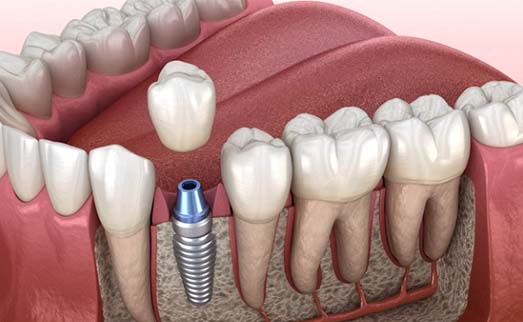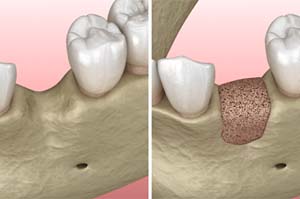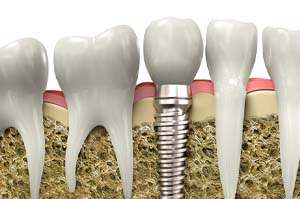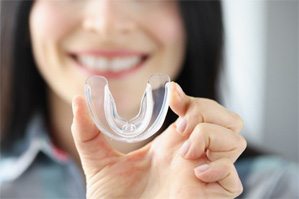
Dental Implants – Carlisle, PA
The Most Comprehensive Solution for Tooth Loss

Have you been struggling to smile because of missing teeth? These days, you no longer have to settle for an incomplete smile. With dental implants, you can enjoy a smile that is more reliable and natural-looking than what traditional dentures and dental bridges can create. Here at Carlisle Family & Cosmetic Dentistry, we can provide start-to-finish care for dental implants in Carlisle, PA for maximum convenience. To learn more about the most comprehensive solution for tooth loss, contact us today and schedule a dental implant consultation!
Why Choose Carlisle Family & Cosmetic Dentistry for Dental Implants?
- Dental Implant Placement & Restoration Performed In-House
- CBCT Scanner for Advanced, Precise Treatment Planning
- Dentist with Extensive Experience in Oral Surgery
What Are Dental Implants?

Every tooth has two parts: the crown that you see when you smile, and the supportive root that is embedded in the jawbone. Tooth replacements usually only recreate the crown by merely sitting on top of the gums, but dental implants are unique in that they bring back the root as well. These titanium posts are positioned in the jaw, where they gradually fuse with the surrounding bone. As a result, they can provide ample support for a stable, long-lasting dental crown, bridge, or denture.
The 4-Step Dental Implant Process

Something that makes dental implants different from dentures and bridges is that they require a multistep process that spans several months. Dr. Neslund and Dr. Benner are experts in placing dental implants, which is why you can conveniently complete your entire treatment in our dental office. Typically, dental implant placement needs to be performed by an offsite specialist. However, since our dentists have the expertise and technology necessary to ensure your implants are successful, you don’t have to see another dental professional or spend more time traveling from office to office. Every person’s treatment varies, but here are the main 4 steps that you can expect.
Initial Dental Implant Consultation

The first step when getting dental implants is your consultation. During this time, we will review your oral health and medical history to determine if you are a good candidate. If necessary, we will work with you to complete preliminary procedures, like gum disease treatment, tooth extractions, or bone grafting, to prepare you for your procedure. Then, we can move forward to planning the rest of your dental implant treatment. During your consultation, we will walk you through the steps, including the timeline and cost.
Dental Implant Surgery

We completes the entire dental implant process in-house, so you don’t need to worry about seeing another dental professional at a different location. First, your mouth will be numbed with a local anesthetic to make sure you don’t feel any discomfort during the surgery. Then, we will make an incision in the gums so he can place the implant posts in the jawbone. Next, the gums are closed and a protective cap is placed over the posts to protect it as your smile heals.
Dental Implant Osseointegration & Abutment Placement

Osseointegration is the process in which the dental implants fuse to the jawbone. This will keep your implants anchored in place, so you don’t need to worry about them shifting around or falling out. When the fusion process Is complete, metal abutments are placed on the end of your dental implants.
Delivery of Dental Implant Restorations

The last step of getting implants is the delivery of your replacement teeth. You will need to return to our office so we can place your crown, bridge, or denture on your implant(s). During this visit, he will ensure that your bite is aligned and comfortable so you can enjoy all of the benefits of your restored smile!
Benefits of Dental Implants

Over 500,000 dental implants are placed every year, and they are quickly becoming one of the most popular ways to replace missing teeth. Due to their unique and precise placement in the jawbone, this tooth loss solution helps patients experience all sorts of different benefits that you can’t get with options like dentures and dental bridges. Here are some of the ones that you can expect when you get dental implants.
Day-to-Day Benefits

Dental implants should feel just like natural teeth when they have completely healed. Then, you can enjoy all of the same things that you did before losing your teeth. Here are some of the benefits that you can experience every day:
- Easy to Maintain: You take care of your dental implants the same way you care for your natural teeth. Brush, floss, rinse, and attend regular cleanings and checkups every six months.
- Increases Confidence: The way that you feel about yourself is very important. However, tooth loss can lower self-esteem. By replacing your teeth with dental implants, you can show off your smile with confidence!
- Restores Bite Force: Your bite force can be replenished by 90% or more! This is much more than what you can expect with dentures or dental bridges.
Health Benefits

Your health will be positively influenced when you get dental implants. Here are a few of them:
- Prevents Bone Loss: Over time, you will experience bone loss after losing teeth. Dental implants stimulate the jawbone, therefore allowing it to remain strong and healthy.
- Better Overall Health: Excellent dental health will have an impact on your overall health. It can even lower your risk of serious medical conditions, like diabetes and heart disease.
- Improved Dental Health: With dental implants, you are less likely to get cavities, gum disease, and infections, and lose more teeth.
Long-Term Benefits

Dental implants are an excellent investment. Here are some of the great things you can experience numerous years down the road:
- Success: Dental implants have a very high success rate of over 95%! You are very unlikely to experience a dental implant failure.
- Save Money: You don’t need to stock up on adhesives or soaking solutions. You don’t need to worry about routine repairs or replacements either.
- Permanent: Dental implants can last more than three decades or even the rest of your life if you are taking all the right steps to care for them.
Who Dental Implants Can Help

There are many instances where dental implants can be utilized. It doesn’t matter if you’re missing a single tooth or multiple teeth, dental implants can effectively restore teeth missing from your smile. In most cases, the only prerequisites are that you have a healthy mouth and a strong jawbone. To learn how we do it, keep reading!
Missing One Tooth

To replace a single tooth, a titanium implant is placed directly into the jaw and allowed to integrate with the bone over time. Once fully healed, a custom-made crown will be placed on top and attached via an abutment, which gives the crown stability. We use porcelain because of its natural-looking qualities.
Missing Multiple Teeth

To replace multiple consecutive teeth in your smile, a bridge designed to fit on top of dental implants can be created. Instead of relying on natural teeth to hold the restoration, a pair of implants are placed on either side inside the gap. These implants are strong enough to hold as much as a three to four consecutive prosthetic teeth.
Missing All Teeth

To replace all teeth in a single arch, an implant denture is most ideal. If you’re tired of your denture always shifting out of place, a set of implants can effectively prevent slippage and give you the confidence to eat the foods you enjoy.
Missing All Teeth with Low Jawbone Density

If you’ve suffered from bone loss in your jaw, then All-on-4 dental implants may be right for you. With this method, your dental implant dentist in Carlisle positions just four implants strategically throughout the jaw to maximize the available bone mass. Then, a denture is attached on top of them. As a bonus, All-on-4 (also known as Teeth-in-a-Day) lets us place your prosthetic on the very same day that you receive your implants.
Understanding the Cost of Dental Implants

Keep in mind that the cost of your dental implant treatment has the potential to fluctuate dramatically depending on your needs. Any preliminary procedures necessary can increase costs and the number of visits necessary to complete treatment, driving up your overall total. You’ll also need to consider the number of implants you intend to place as well as the type of restoration used to fill the gaps in your smile. Both are major factors in determining overall cost.
Even at their high price tag, dental implants are often considered to be the most cost-effective solution because of their longevity and restorative benefits. Dentures require regular relines and replacements, while dental bridges don’t always stand the test of time. Both will require additional maintenance as well, even though they don’t offer the same restorative benefits as implants. In contrast, dental implants can easily last a lifetime when properly cared for, which is not something you can say for other tooth replacement methods.
Types of Dental Implants

Everyone’s mouth is different, so the dental implant process varies greatly from patient to patient. For instance, a patient missing a single tooth can receive just one implant post restored with a dental crown. This will cost less than an implant bridge, which requires two implants. An implant denture needs four or more implants and comes with an even higher price.
The number of implants you’re getting, as well as the materials they’re made from and where in your mouth they are being placed, will affect the overall cost.
What Are the Stages of Dental Implant Treatment?

Getting dental implants takes multiple appointments, each of which comes with its own unique cost. Some of the stages include:
- Initial consultation with Dr. Neslund or Dr. Benner, your dental implant dentists in Carlisle
- Any needed preparatory work like bone grafting or a sinus lift
- Implant placement surgery
- Small surgery to place the abutments (tiny metal pieces that attach your implants to your restoration)
- Design and placement of the permanent restoration (crown, bridge, or denture)
Are Dental Implants Worth the Investment?

Absolutely! While it’s true that they cost more in the beginning, consider the savings you’ll gain in the long term. Alternative prosthetics have to be repaired or replaced every five to 10 years. By contrast, dental implants can last for 30 years or more. You’ll spend less time and money over the years sitting in the dental chair and getting your teeth fixed.
Additionally, dental implants deliver benefits that other options can’t. Because of their foundation in your jawbone, they’ll feel natural and let you chew practically any food. They also stimulate the jawbone and support your facial muscles, keeping you looking young.
Does My Dental Insurance Cover Dental Implants?

These days, more and more dental insurance carriers are starting to cover implants, but many of them still do not. You’ll have to check your individual policy. Even if the implants themselves are not covered, insurance could mitigate the cost of preparatory treatment or your final restoration. Our team will happily take a look at your plan and determine how much coverage you qualify for. We also partner with CareCredit to help you fund your treatment with low-interest loans.
If you’re ready to transform your grin with dental implants in Carlisle, contact Carlisle Family & Cosmetic Dentistry today. We look forward to helping you smile!
Advanced Dental Implant Procedures

Tooth loss causes the jawbone to slowly disintegrate and lose its shape. Patients who wait too long to replace their teeth may have a weak jawbone that cannot support dental implants. To build up a weak jawbone, we may recommend an advanced dental implant procedure, the most common of which is called a bone graft. While this treatment will increase your total treatment time, it also greatly increases the success rate of your new smile.
What Is a Dental Bone Graft?

A dental bone graft adds bone tissue to an area where the jawbone is weak or where there is insufficient bone structure to support the dental implant. The replacement bone tissue may come from another part of your body, like the back of the jaw, the shin, or the hip. This type of bone graft is known as an allograft. Donor bone tissue can also come from cadavers or even cows. Synthetic tissue is another alternative. The type of bone graft you receive depends on the amount of bone tissue needed, the health of your bone, and your personal preference.
Why Is a Bone Graft Needed?

If you want to have your teeth replaced with dental implants but are told you need a bone graft procedure before, do not be discouraged. You can enjoy the stability and improved oral health that dental implants provide; the process will just take a little longer.
Dental implants have more than a 95 percent success rate in eligible candidates. One requirement of dental implants is a healthy jawbone. They need sturdy, strong bone matter for proper anchoring. A bone graft is performed when significant jawbone structure has been lost as a result of the missing teeth, or existing bone may be weak.
How Is a Bone Graft Performed?

A bone graft procedure is completed by an oral surgeon using local anesthesia at the donor site as well as in the gum. First, the surgeon removes tissue from the donor site (for an allograft). A small slit is opened in the gum tissue, and this block of donor bone is placed in the area lacking bone matter. The new bone is held in place with small screws which are removed after the bone graft has healed and dental implants are ready for placement.
After the bone graft has been performed, healing will take place over several months. A typical bone graft requires six to nine months to heal. Patients who need a bone augmentation procedure before receiving dental implants should expect longer treatment times for proper healing following the bone graft.
Dental Implants Post-Op Instructions

We care about helping our patients stay as comfortable as possible during and after their dental implant surgery. To that end, once you have received your dental implants, we will give you detailed aftercare instructions to follow. Below is a look at some of the steps you will need to take after the procedure. Remember that you can always give us a call if you’re unclear on the instructions you’ve received or if you have any concerns.
What to Do Directly After Dental Implant Surgery

After your surgery, a blood clot will form at the implant site. This blood clot needs to stay in place so that your mouth can heal without issue. As such, in the days following the procedure, you need to avoid doing anything that might disturb the blood clot. Drinking from a straw, touching the area with your fingers, spitting, and smoking are all examples of behaviors that you will need to avoid for the time being.
Common Side Effects When Recovering from Dental Implant Placement

You will likely experience some mild discomfort and swelling after your dental implant surgery, and there may be some periodic bleeding. There’s no need to be concerned about these symptoms; you can typically control them with basic measures, such as taking over-the-counter pain medication, applying a cold compress to the area, or lightly pressing down on bleeding areas with gauze. Please let us know if your symptoms are lasting longer than normal.
Your Diet After Dental Implant Surgery

Trying to eat hard or crunchy foods immediately after dental implant surgery could cause problems for your blood clot. It’s generally recommended that you only eat soft foods for a while after the procedure. (The exact amount of time can vary, but it can be as long as 10 to 14 days for some patients.) Fortunately, there are plenty of examples of soft foods that you can enjoy, such as mashed potatoes, pudding, pasta, yogurt, and scrambled eggs.
Post-Op Health & Oral Hygiene

You may find yourself wondering whether you should stop brushing for a while after dental implant placement. The answer is no; as long as you’re careful around the implant posts, you should be able to stick to your normal brushing routine. Furthermore, to reduce the chances of an infection occurring while your mouth is healing, you should rinse with salt water at least two to three times a day. (Just remember not to spit when you’re done; simply allow the water to pour out of your mouth.)
What to Do After Your New Teeth Are Attached

By the time you receive your final implant crown, bridge, or denture, you shouldn’t be experiencing any bleeding or swelling. (And if you do, you should call our team immediately.) You might notice some sensitivity in your gums; if so, you should be able to control it with pain relievers.
Maintaining & Caring for Your Dental Implants

As you might know, dental implants can be highly effective; they even have the potential to keep smiles healthy for a lifetime. That said, they’ll only work well if you take good care of them. Not doing so will cause the prosthetic teeth to fail or need replacement. Luckily, we at Carlisle Family & Cosmetic Dentistry can keep that from happening. To that end, here are some tips on dental implant care in Carlisle – use them to enjoy your newly rebuilt smile. Otherwise, book a visit for more details!
Make Oral Hygiene a Priority

True enough, implants won’t get cavities – they’re artificial, after all. Still, you must practice good oral hygiene to keep them functional. You might suffer gum disease or tooth infections otherwise, both of which can cause implant failure.
As for how to go about proper dental care, remember to do the following:
- Brush your teeth twice daily with a soft-bristled toothbrush.
- Floss once per day with either traditional floss or a flossing tool.
- Rinse your mouth once daily with flouridated mouthwash
Eat a Healthy Diet

Notably, implants strengthen your bite and allow you to (once again) eat tougher foods. Take advantage of that fact and fill up on leafy greens, lean proteins, dairy products, and other healthy fares. Doing so will keep your jaw and gum tissues strong, ensuring your implants last a long while.
At the same time, try not to overindulge in hard, sticky, or sugary stuff. These products can cause gum infections or chip your prosthetic teeth, leading to implant failure.
Break Bad Habits

It’s always a good idea to break bad oral habits. However, giving up these practices is even more crucial when you have implants. If you don’t, they might make your implants break or fail.
To start, consider cutting out habits like:
- Smoking – Besides causing cancer, smoking can lead to gum disease. Furthermore, the practice keeps implants from fusing with your jaw.
- Nail-biting & Ice-Chewing –Biting on hard surfaces like fingernails and ice cubes isn’t good for you. Doing so wears away enamel and might even damage your restorations.
Protect Your Dental Implants

Dental implants are strong, but they aren’t indestructible. Too much external force can cause them to break and fail over time. You’ll thus want to give your new teeth some solid protection.
One good option is to get a custom-made mouthguard. If you’re a big sports player, this appliance could protect you from dental injuries. On the other hand, a personalized nightguard could help you avoid wear and tear from tooth grinding.
Schedule Regular Dental Checkups

Last but not least, make sure to attend your six-month dental checkups and cleanings. That way, your dentist can ensure your implants always work.
You see, checkups are preventive care – they monitor your implant and spot potential problems early. By attending them, you can thus treat issues before they threaten your new tooth (or teeth). Preserving your implant this way is also cost-effective, saving you time and money otherwise spent on replacements.
Dental Implant FAQs
Dental implants in Carlisle are the most reliable method of replacing lost teeth. However, they are a big investment. Don't worry if you have some concerns before you're ready to commit to them. Your dentist at Carlisle Family & Cosmetic Dentistry will explain everything during your consultation and address your apprehensions. Here are the answers to the most frequently asked questions about dental implants to help determine if they are right for you.
Does It Hurt to Get Dental Implants?
You will require oral surgery to insert a titanium post into your jawbone to serve as a root. You won't have any pain during the procedure because sedation or anesthesia will be used to keep you comfortable. Although you won't feel anything during your surgery, your mouth will be tender for a few days after the effects of any medications wear off. You can manage it with an over-the-counter pain reliever and applying a cold compress. Your implant dentist will review any additional aftercare instructions before you go home, like dietary restrictions.
Can I Take Dental Implants Out?
A dental implant is unlike any other treatment because it recreates the entire tooth structure. Your implant post is placed into your jaw to support your restoration. Your bone will fuse to the implant over time. Therefore, you cannot remove them, but some implant dentures are removable for easy cleaning. Only an implant dentist in Carlisle can remove the posts, like in cases of failure.
How Long Do Dental Implants Last?
Dental implants have over a 95% success rate and are proven to last for 30 years or more, but many factors affect their lifespan. The biggest threat to their longevity is an infection called peri-implantitis, which is like gum disease. Good oral hygiene will keep the infection at bay. Brush your teeth at least twice a day and floss daily. Visit your dentist every 6 months for a cleaning and checkup to get the most from your investment. Your dentist will recommend breaking any bad habits that may increase your risk of failure, like smoking, drinking a lot of alcohol, or grinding your teeth.
What are the Signs of Dental Implant Failure?
Dental implant failure occurs in less than 5% of cases, but it's important to watch for anything concerning. Red, swollen, and bleeding gums can't indicate an infection. If you have any pain when placing pressure on your implant, it's a sign you need to contact your dentist. If you note any changes, do not wait to schedule an appointment or it can be too late to save your investment.
What Should I Do If My Implant is Loose?
After your jaw has integrated with the post, your dental implant should never feel loose. If your new tooth is a little wiggly, contact our office right away. While it could be a damaged restoration, it can be a more serious problem, like rejection or bone loss.